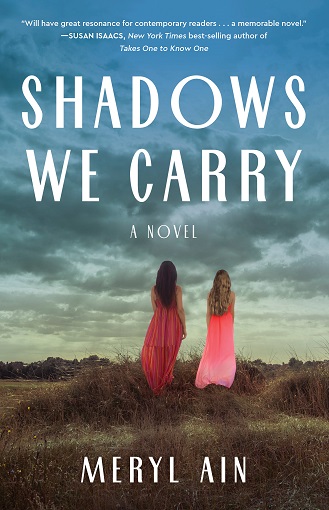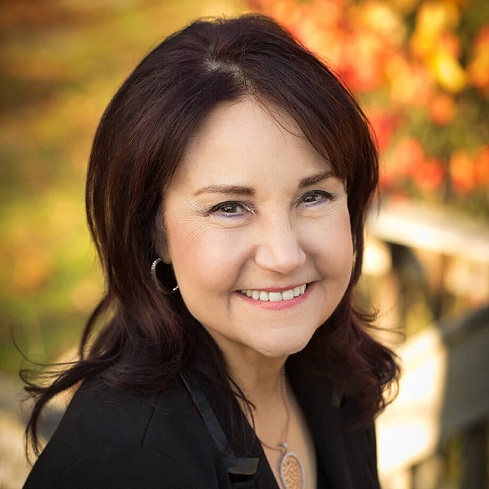I don’t think that any author’s characters are entirely fictitious, especially in historical fiction. There must be a kernel of truth, or it would not be realistic. All my characters are composites – borrowing from the real world and my imagination.
Meryl Ain – 25 April 2023
The Back Flap
In this eagerly anticipated sequel to Meryl Ain’s award-winning post-Holocaust novel The Takeaway Men, we follow Bronka and JoJo Lubinski as they find themselves on the cusp of momentous change for women in the late 1960s. With the United States in the grip of political and social upheaval, the twins and a number of their peers, including a Catholic priest and the son of a Nazi, struggle with their family’s ancestry and how much influence it has on their lives. Meanwhile, both young women seek to define their roles as women, and as individuals.
Enlightening and evocative, Shadows We Carry explores the experience of navigating deeply held family secrets and bloodlines, confusing religious identities, and the scars of World War II in the wake of revolutionary societal changes.
About the book
What is the book about?
It’s about twin sisters who are Second Generation Holocaust Survivors and who come of age on the cusp of momentous change for women in the late 1960s. With the United States in the grip of political and social upheaval, the twins and a number of their peers — including a Catholic priest and the son of a Nazi — struggle with their family’s ancestry and how much influence it has on their lives. Meanwhile, both young women seek to define their roles as women and as individuals.
When did you start writing the book?
I started writing it a little less than a year after my debut novel, The Takeaway Men, was published in 2020.
How long did it take you to write it?
About nine months.
Where did you get the idea from?
Many readers of The Takeaway Men asked me to write a sequel because the book ended when the twins were 15-years-old. They wanted to know what happened to the girls as they got older. I was still attached to the characters and I thought it was a good idea to continue the story.
Were there any parts of the book where you struggled?
I struggled with the fate of the Nazi, who was on the run in the book. Since the novel is historical fiction, it had to be feasible and in line with what occurred during the time period the story is told.
What came easily?
Since this is a sequel, I knew the main characters very well. In some ways, it was a seamless process.
Are your characters entirely fictitious or have you borrowed from real world people you know?
I don’t think that any author’s characters are entirely fictitious, especially in historical fiction. There must be a kernel of truth, or it would not be realistic. All my characters are composites – borrowing from the real world and my imagination.
We all know how important it is for writers to read. Are there any particular authors that have influenced how you write and, if so, how have they influenced you?
I am especially a fan of Philip Roth. Most of his books are set in his New Jersey hometown and it’s clear that he deeply knows both his characters and the settings. I placed my characters in my hometown of Queens, New York, following Roth’s influence. I also loved the book, Cutting for Stone, by Abraham Verghese. He used the vehicle of twins to tell his story and so did I.
Do you have a target reader?
While both men and women have told me they enjoy my writing, my target reader is probably a baby boomer woman or her daughter.
About Writing
Do you have a writing process? If so can you please describe it?
I don’t know if you’d call it a process, but when I’m writing a book I try to write for three or four hours, beginning early in the morning. Before I begin writing, I always reread what I wrote the day before and sometimes I’ll edit it. Then I’ll go on to continue the story.
Do you outline? If so, do you do so extensively or just chapter headings and a couple of sentences?
I do not outline.
Do you edit as you go or wait until you’ve finished?
I edit both as I go and when I’m finished.
Do you listen to music while you write? If yes, what gets the fingers tapping?
I don’t listen to music while I’m writing. But I do find that if I listen to music while I’m walking, it may inspire me to write.
About Publishing
Did you submit your work to Agents?
No.
What made you decide to go Indie, whether self-publishing or with an indie publisher? Was it a particular event or a gradual process?
I had worked with agents for a non-fiction book I co-wrote several years ago. It was a two-year process with lots of “almosts” — positive feedback, but no results. I decided I did not want to invest two years of my life in a process that might not yield results. The indie publisher worked best for me.
Did you get your book cover professionally done or did you do it yourself?
My publisher took care of it – with my input — and I’m very pleased with the result.
Do you have a marketing plan for the book or are you just winging it?
Since this is my second novel, I know what worked last time. I wouldn’t call it a plan, but I have some parameters.
Any advice that you would like to give to other newbies considering becoming Indie authors?
I suggest that you speak to other authors about their experiences with a particular indie publisher. In addition, read some of their books to check out the quality of the content, editing, and overall look of the book. It’s also a good idea to inquire about the distribution channels the publisher uses.
End of Interview:
For more from Meryl Ain visit her website and follow her on Instagram, Facebook, and Twitter.
Get your copy of Shadows We Carry from Amazon US or Amazon UK.


